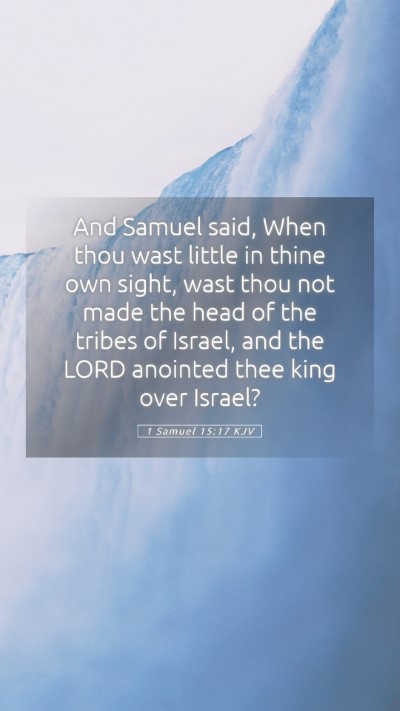Understanding 1 Samuel 15:17
This commentary explores the meaning and significance of 1 Samuel 15:17, which states: "And Samuel said, When thou wast little in thine own sight, wast thou not made the head of the tribes of Israel? and the LORD anointed thee king over Israel."
This verse is pivotal in understanding the context of Saul's kingship and the principles of humility, obedience, and divine selection.
Bible Verse Interpretations
-
Matthew Henry's Commentary:
Henry emphasizes the importance of humility in Saul's early reign. He notes that Saul was chosen by God when he was humble and aware of his limitations. This humility was crucial as it established a foundation for his leadership. The warning is clear: pride and self-exaltation can lead to decline, as witnessed in Saul’s later actions.
-
Albert Barnes' Commentary:
Barnes points out that God's anointing of Saul was an act of grace, where God honored Saul despite his modest beginnings. He interprets the verse as a reminder of how divine purpose can elevate individuals who are preeminently aware of their own insufficiency. It reiterates that spiritual elevation is often at odds with human expectations.
-
Adam Clarke's Commentary:
Clarke discusses the role of God's chosen leaders, citing this verse to illustrate that God selects individuals based on His foresight and divine providence. He highlights that God's selection of Saul was not merely a recognition of his abilities but an act of divine grace, underscoring a message about the need for leaders to remain humble and aligned with God's will.
Theological Insights
1 Samuel 15:17 serves as an admonition regarding the nature of leadership within the context of biblical theology. It shows that:
- Humility is Essential: The verse calls out the necessity for leaders to remain humble, acknowledging their reliance on God.
- God Chooses the Unlikely: It reinforces the notion that God often chooses individuals who society might overlook or deem unsuitable.
- The Consequences of Pride: Saul's eventual downfall is directly tied to his pride and disobedience, reminding readers that leaders must adhere to God's commands.
Application of Bible Verse
For individuals seeking to apply this verse in their lives, consider the following:
- Engage in self-reflection to recognize areas in which you may need humility.
- Consider your leadership roles—whether in your family, workplace, or community—and focus on how you can lead with grace and awareness of your limitations.
- Seek God's guidance continually in your decisions and actions.
Historical Context
Understanding the historical context of this passage is crucial for deeper Bible study insights. Saul's appointment as king was transformative for Israel, transitioning from a theocracy to a monarchy. This shift carried responsibilities that demanded not only strong leadership but also a constant reliance on God.
Bible Cross References
This verse relates closely to:
- 1 Samuel 10:1: Discusses the anointing of Saul and sets the stage for his kingship.
- Proverbs 16:18: "Pride goes before destruction, a haughty spirit before a fall."
- Philippians 2:3: Encourages believers to act with humility considering others better than themselves.
Conclusion
In summary, 1 Samuel 15:17 is a powerful reminder that God's choice of leaders is grounded in humility and divine purpose. It serves as an exhortation not only to those in positions of authority but also to every believer to strive for a heart aligned with God’s will. Reflecting on these principles can guide personal development and enhance our understanding of how to apply biblical teachings in everyday life.
For more in-depth discussions on Bible verse meanings and interpretations, engage with various Bible study resources and commentaries.


